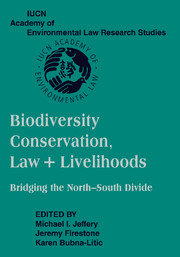 Biodiversity Conservation, Law and Livelihoods: Bridging the North-South Divide
Biodiversity Conservation, Law and Livelihoods: Bridging the North-South Divide Published online by Cambridge University Press: 31 July 2009
INTRODUCTION
The importance of forests as sources of food, medicine, habitats, and sinks, inter alia, cannot be overemphasized: humankind's very existence relies on the continued existence of these vital natural resources. This can be summed up in the adage, “When the last tree dies, the last man dies.” Indeed, the phenomenon of climate change has been declared a common concern of humankind; and forests as sinks for carbon have been identified as one of the major means for dealing with the phenomenon. Hence, the existence of forests anywhere in the world must be of concern to the entire global community.
In Ghana, the forestry sector contributes almost 6 percent of the country's Gross Domestic Product (GDP), with the timber industry providing direct employment to over 100,00 people and indirect employment to over 2.5 million others. Wood fuel accounts for 75 percent of Ghanaian domestic and industrial energy sources estimated at $USD200 million per annum. Hunting and the trade in bush meat also account for between $USD270 and $USD350 million annually. Nontimber forest products also contribute to the daily livelihood of forest fringe communities and the national economy by creating employment for a substantial number of people and by generating an annual amount of $USD250 million. The sector is also the backbone of the country's mainly nature-based tourism industry. Because of well-funded protected areas and the diversity of these nature-based attractions, this sector has become the number three foreign exchange earner for Ghana.
To save this book to your Kindle, first ensure [email protected] is added to your Approved Personal Document E-mail List under your Personal Document Settings on the Manage Your Content and Devices page of your Amazon account. Then enter the ‘name’ part of your Kindle email address below. Find out more about saving to your Kindle.
Note you can select to save to either the @free.kindle.com or @kindle.com variations. ‘@free.kindle.com’ emails are free but can only be saved to your device when it is connected to wi-fi. ‘@kindle.com’ emails can be delivered even when you are not connected to wi-fi, but note that service fees apply.
Find out more about the Kindle Personal Document Service.
To save content items to your account, please confirm that you agree to abide by our usage policies. If this is the first time you use this feature, you will be asked to authorise Cambridge Core to connect with your account. Find out more about saving content to Dropbox.
To save content items to your account, please confirm that you agree to abide by our usage policies. If this is the first time you use this feature, you will be asked to authorise Cambridge Core to connect with your account. Find out more about saving content to Google Drive.